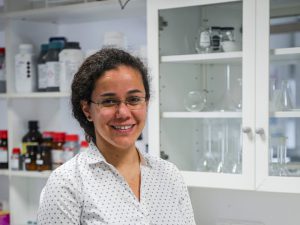BY AFSHAN NABI (MBG/IV)
Personal:
I was born in Ankara and completed my high school degree at TED Ankara Koleji.
Why did you become a professor?
I haven’t become a professor, yet :). But if you ask me why I became a scientist, I believe it was the natural course of events that took a curious mind to where it is now.
Why did you choose Bilkent? What do you like most about being here?
I chose to work at Bilkent because of the dynamic atmosphere that values scientific research endeavors. It’s also great to breathe the same air as students and colleagues sharing the same spirit of scientific curiosity and dedication to excellence.
Research:
I obtained my PhD in chemistry at the Freie Universität Berlin, working on a topic involving self-assembly and molecular machines. Then I pursued five years of postdoctoral work at Northwestern University and Harvard University on electrostatics, mechanochemistry and soft robotics.
What projects are you working on currently?
I have several projects on static electricity and the mechanochemistry of polymers and plastics and also soft robotics in progress. They are funded by TÜBİTAK, ERA-NET (European Commission), TÜBA GEBİP and BAGEP (Bilim Akademisi).
What excites you about your work?
As a scientist, I love to come up with new ideas, to share them with people, and to work together to discover something that didn’t exist before. I’m excited to see an amazing result – a soft plant robot moving to catch a beam of light, a new discovery in electrostatics, a new composite material – just popping out during a late-night experiment.
Could you share a turning point or defining moment in your career?
Meeting my high school chemistry teacher, Mustafa Üstünışık.
What has been the most exciting moment of your career so far?
The most exciting moments for science people are those when their scientific results are recognized and published in high-impact journals. I published twice in Science during my postdoctoral work; now, from our new Bilkent address, our group has published in Science Advances and Nature Communications. These are very exciting events for us, the Bilkent community and Turkey. Also, I recently received the Mustafa
Parlar Award from ODTÜ, my alma mater, which was deeply exciting for me.
When and where do you do your best thinking?
Since I’m the mother of a four-year-old, I don’t have the luxury of having time to myself. So I do my thinking whenever, wherever possible.
What are you most curious about?
I’m curious about many things, but in particular I’m very curious about how static electricity forms. Since this is a millennia-old question, it will take some time until Baytekin group solves this mystery [said with a smile].
What’s the most common misconception about your work? That static electricity forms when an electron moves from one insulator to another insulator. (No!)
What do you like to do when you’re not working?
Talk, eat and play with my daughter Ayça. I’m trying to grasp her thinking about static electricity matters.
Which books have influenced you the most, and why?
I can’t name any particular book. All the books we read, all the people we meet contribute to who are. I’m trying to have experiences of both kinds.
If you weren’t a professor, what career would you choose?
I didn’t choose to be a scientist; I just became one. If I had the requisite skills, I suppose I would be a writer or an artist – those vocations would give me a similar creative enthusiasm.
If you could go back to your student years, what advice would you give your younger self?
Join the ODTÜ Dağcılık ve Kış Sporları Grubu.
